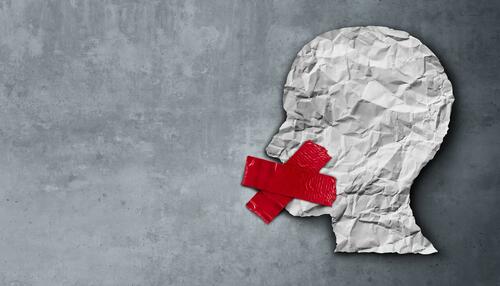
Authored by J.B.Shurk via The Gatestone Institute,
Attacks on free speech are on the rise.
A British college recently expelled a student for expressing support for the government's official policy of deporting illegal immigrants. A Wisconsin school district charged three middle-schoolers with sexual harassment last month for refusing to use the plural pronoun "they" when referring to a single classmate. US President Joe Biden's National Climate Advisor Gina McCarthy recently encouraged social media companies to censor from their online platforms any opinions that contradict Biden's climate change narrative.
In its continued commitment to preserve the government's monopoly over COVID-19 information, Twitter actually suspended a medical doctor for merely sharing a scientific study that suggests the Pfizer vaccine affects male fertility. And the NFL's Washington Commanders fined defensive coordinator Jack Del Rio $100,000 and forced him to apologize only weeks ago for having expressed his opinion that 2020's summer of riots across the United States after George Floyd's death was more destructive than the few hours of mayhem at the Capitol on January 6, 2021.
In contrast, it has become newsworthy that entertainment powerhouse Paramount has chosen not to censor old movies and television shows containing content that today's "woke" scolds might find "offensive." In a "cancel culture" world where censorship and trigger warnings have become the norm, preserving the artistic integrity of a film is now considered outright daring. In fact, even publishers of old literary classics have begun rewriting content to conform with "politically correct" sensibilities.
Examples such as these, where personal speech is either censored or punished, are becoming much more frequent, and anybody who minimizes the threat this increased intolerance for free expression poses to a democratic society is either gullibly or willfully blind. As any defender of liberty knows, nothing more quickly transforms a free society into a totalitarian prison than crackdowns on speech. Of all the tools of coercion available to a government, preventing individuals from freely expressing their thoughts is most dangerous. Denying citizens that most basic societal release valve for pent-up anger and disagreement only heightens the risk for outright violence down the line. Either silenced citizens become so enraged that conflict becomes inevitable, or the iron fist of government force descends on the public more broadly to preemptively curtail that possibility. Either way, the result is a disaster for any free society.
For Americans who cherish free speech, this undeniable war on language and expression is jolting but not shocking. Whenever censorship slithers back into polite society, it is always draped in the mantle of "good intentions."
Fifteenth-century Dominican friar Girolamo Savonarola's "bonfire of the vanities" destroyed anything that could be seen to invite or reflect sin.
The notorious 1933 Nazi book burning at the Bebelplatz in Berlin torched some 20,000 books deemed subversive or "un-German".
During Communist China's decade-long Cultural Revolution in the 1960s and '70s, the vast majority of China's traditional scrolls, literature and religious antiquities went up in smoke.
All three atrocities were celebrated as achievements for the "greater good" of society, and people inebriated with "good intentions" set their cultural achievements aflame with fervor and triumph. Much like today's new censors who claim to "fight hate" because "that's not who we are," the arsonists of the past saw themselves as moral paragons, too. They purged anything "obscene" or "traditional" or "old," so that theocracy, Nazism, or communism could take root and grow. And if Western institutions today are purging ideas once again, then it is past time for people to start asking just what those institutions plan to harvest next.
We in the West are running — not walking — toward another "bonfire of the vanities" in which normal people, egged on by their leaders, will eagerly destroy their own culture while claiming to save it. This time around the "vanities" will be condemned for their racist, sexist, transphobic, anti-science or climate-denying ways, but when they are thrown into the fire, it is dissent and free expression that will burn.
There will one day be much disagreement as to how the same Western Civilization that produced the Enlightenment and its hallowed regard for free expression could once again surrender itself to the petty tyranny of censorship.
Many will wonder how the West's much-vaunted "liberal" traditions could meekly fold to the specter of state-controlled speech.
The answer is that the West has fallen into the same trap that always catches unsuspecting citizens by surprise: the steady encroachment on free speech has been sold as a "virtue" that all good people should applaud.
First, certain thoughts became "aggravating factors" that turned traditional crimes into new "hate crimes" deserving of additional punishment.
Then the definition of what is "hateful" grew until politicians could comfortably decree anything at odds with their agendas to be examples of "hate."
Who would be for "hate," after all? Surely no-one of good sense or good manners.
Now "hate" has transformed into an elusive description for any speech that can be alleged to cause the slightest of harms.
From there, it was easy for the state to decree that "disinformation," or rather anything that can be seen to contradict the state's own official narratives, causes "harm," too.
Those who despise free speech told society, "If you do not punish hate, then you're a bigot." And today, if you oppose the government's COVID-19, climate change, immigration, or other contentious policies, your harmful "disinformation" must be punished, too.
It is a slippery slope, is it not? Once governments normalize censorship and the punishment of points of view, free expression is firmly stamped with an expiration date.
After the Nazis went down this poisonous path, repentant Germans built a public memorial to remember the book burning at the Bebelplatz and ensure its tragic lesson was never forgotten. On a plaque in the square is a commemorative engraving, paraphrasing the 19th century German writer Heinrich Heine:
"That was only a prelude; where they burn books, they will in the end also burn people."
That warning comes with no expiration date.
Authored by J.B.Shurk via The Gatestone Institute,
Attacks on free speech are on the rise.
A British college recently expelled a student for expressing support for the government’s official policy of deporting illegal immigrants. A Wisconsin school district charged three middle-schoolers with sexual harassment last month for refusing to use the plural pronoun “they” when referring to a single classmate. US President Joe Biden’s National Climate Advisor Gina McCarthy recently encouraged social media companies to censor from their online platforms any opinions that contradict Biden’s climate change narrative.
In its continued commitment to preserve the government’s monopoly over COVID-19 information, Twitter actually suspended a medical doctor for merely sharing a scientific study that suggests the Pfizer vaccine affects male fertility. And the NFL’s Washington Commanders fined defensive coordinator Jack Del Rio $100,000 and forced him to apologize only weeks ago for having expressed his opinion that 2020’s summer of riots across the United States after George Floyd’s death was more destructive than the few hours of mayhem at the Capitol on January 6, 2021.
In contrast, it has become newsworthy that entertainment powerhouse Paramount has chosen not to censor old movies and television shows containing content that today’s “woke” scolds might find “offensive.” In a “cancel culture” world where censorship and trigger warnings have become the norm, preserving the artistic integrity of a film is now considered outright daring. In fact, even publishers of old literary classics have begun rewriting content to conform with “politically correct” sensibilities.
Examples such as these, where personal speech is either censored or punished, are becoming much more frequent, and anybody who minimizes the threat this increased intolerance for free expression poses to a democratic society is either gullibly or willfully blind. As any defender of liberty knows, nothing more quickly transforms a free society into a totalitarian prison than crackdowns on speech. Of all the tools of coercion available to a government, preventing individuals from freely expressing their thoughts is most dangerous. Denying citizens that most basic societal release valve for pent-up anger and disagreement only heightens the risk for outright violence down the line. Either silenced citizens become so enraged that conflict becomes inevitable, or the iron fist of government force descends on the public more broadly to preemptively curtail that possibility. Either way, the result is a disaster for any free society.
For Americans who cherish free speech, this undeniable war on language and expression is jolting but not shocking. Whenever censorship slithers back into polite society, it is always draped in the mantle of “good intentions.”
Fifteenth-century Dominican friar Girolamo Savonarola’s “bonfire of the vanities” destroyed anything that could be seen to invite or reflect sin.
The notorious 1933 Nazi book burning at the Bebelplatz in Berlin torched some 20,000 books deemed subversive or “un-German”.
During Communist China’s decade-long Cultural Revolution in the 1960s and ’70s, the vast majority of China’s traditional scrolls, literature and religious antiquities went up in smoke.
All three atrocities were celebrated as achievements for the “greater good” of society, and people inebriated with “good intentions” set their cultural achievements aflame with fervor and triumph. Much like today’s new censors who claim to “fight hate” because “that’s not who we are,” the arsonists of the past saw themselves as moral paragons, too. They purged anything “obscene” or “traditional” or “old,” so that theocracy, Nazism, or communism could take root and grow. And if Western institutions today are purging ideas once again, then it is past time for people to start asking just what those institutions plan to harvest next.
We in the West are running — not walking — toward another “bonfire of the vanities” in which normal people, egged on by their leaders, will eagerly destroy their own culture while claiming to save it. This time around the “vanities” will be condemned for their racist, sexist, transphobic, anti-science or climate-denying ways, but when they are thrown into the fire, it is dissent and free expression that will burn.
There will one day be much disagreement as to how the same Western Civilization that produced the Enlightenment and its hallowed regard for free expression could once again surrender itself to the petty tyranny of censorship.
Many will wonder how the West’s much-vaunted “liberal” traditions could meekly fold to the specter of state-controlled speech.
The answer is that the West has fallen into the same trap that always catches unsuspecting citizens by surprise: the steady encroachment on free speech has been sold as a “virtue” that all good people should applaud.
First, certain thoughts became “aggravating factors” that turned traditional crimes into new “hate crimes” deserving of additional punishment.
Then the definition of what is “hateful” grew until politicians could comfortably decree anything at odds with their agendas to be examples of “hate.”
Who would be for “hate,” after all? Surely no-one of good sense or good manners.
Now “hate” has transformed into an elusive description for any speech that can be alleged to cause the slightest of harms.
From there, it was easy for the state to decree that “disinformation,” or rather anything that can be seen to contradict the state’s own official narratives, causes “harm,” too.
Those who despise free speech told society, “If you do not punish hate, then you’re a bigot.” And today, if you oppose the government’s COVID-19, climate change, immigration, or other contentious policies, your harmful “disinformation” must be punished, too.
It is a slippery slope, is it not? Once governments normalize censorship and the punishment of points of view, free expression is firmly stamped with an expiration date.
After the Nazis went down this poisonous path, repentant Germans built a public memorial to remember the book burning at the Bebelplatz and ensure its tragic lesson was never forgotten. On a plaque in the square is a commemorative engraving, paraphrasing the 19th century German writer Heinrich Heine:
“That was only a prelude; where they burn books, they will in the end also burn people.”
That warning comes with no expiration date.





